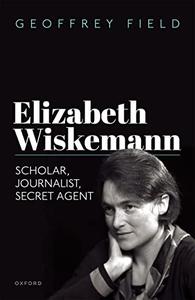
Elizabeth Wiskemann
by Field, Geoffrey;
English | 2022 | ISBN: 0192870629 | 346 pages | True PDF EPUB | 8.02 MB
This biography examines the life and career of scholar-journalist Elizabeth Wiskemann (1899-1971) from her youth and student years at Cambridge to her death by suicide. Disappointed in her hopes for an academic career, she reinvented herself as a journalist in Berlin, covering the overthrow of the Weimar Republic and the rise of Nazism for The New Statesman, Nation, and numerous other newspapers and periodicals. Expelled from Germany, she settled in
Prague and funded by Chatham House wrote the most important account of the Czech-German conflict and the Sudeten crisis, still a classic, followed by a detailed analysis of Nazi political and economic destabilization of the countries of eastern Europe. Her journalistic skills served her well in the war years when she
worked as a secret agent in Switzerland, gathering intelligence, running agents into Axis-controlled Europe, and working closely with Allen Dulles, the O.S.S. chief in Bern. Postwar, Wiskemann returned to freelance journalism, focusing especially on Italy and Germany, while also writing several books, including the first scholarly study of the Hitler-Mussolini relationship and the first major account of the expulsion of 12 million ethnic Germans from Eastern Europe. Although a prolific writer
and highly regarded as a commentator on international affairs, she remained on the fringes of academia until 1958 when she was appointed Professor of International Relations at Edinburgh (the first woman to receive a Chair there in any discipline); she later became one of the first faculty recruited
by the new Sussex University. In her later years she published several works of contemporary history, including Europe of the Dictators, 1919-45, widely used in schools and universities. Blinded in one eye by a botched surgery and increasingly anxious as her other eye deteriorated, she became terrified of going completely blind and ended her life. Aside from its intrinsic interest, Wiskemann's biography is illustrative of a whole cohort of women - graduates in the 1920s and 30s - who
found ways to pursue their interests in international affairs and contemporary history. In this sense the book foregrounds the gendered experience of these pioneers whose professional lives often intersected through journalism, Chatham House, and service in the propaganda and intelligence agencies of the
wartime state.
Fikper
kqsf2.E.W.S.J.S.A.rar.html
Rapidgator
kqsf2.E.W.S.J.S.A.rar.html
NitroFlare
kqsf2.E.W.S.J.S.A.rar
Uploadgig
kqsf2.E.W.S.J.S.A.rar
Please Help Me Click Connect Icon Below Here and Share News to Social Network | Thanks you !
